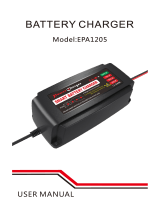
EN • 7
CAUSE BATTERY EXPLOSION.
TO REDUCE RISK OF
A SPARK NEAR BATTERY:
a) Check polarity of battery terminals. POSITIVE (POS,
P, +) battery post usually has a larger diameter than
NEGATIVE (NEG, N, -) post.
b) Connect POSITIVE (RED) charger clip to POSITIVE (POS,
P, +) post of battery.
c) Position yourself and free end of cable as far away from
battery as possible – then connect NEGATIVE (BLACK)
charger clip to NEGATIVE (NEG, N, -) post of battery.
d) Do not face battery when making the final connection.
e) When disconnecting charger, always do so in reverse
sequence of connecting procedure and break first con-
nection while as far away from battery as practical.
f) A marine (boat) battery must be removed and charged
on shore. To charge it on board requires equipment spe-
cially designed for marine use.
IMPORTANT SAFETY
INFORMATION!
• Charge no other batteries than specified in TECHNICAL
INFORMATION.
• Check the charger cables prior to use. Ensure that no
cracks have occurred in the cables or in the bend protec-
tion. A charger with damaged cables must be returned to
the retailer.
• Ensure that the cabling does not jam or comes into contact
with hot surfaces or sharp edges.
• Never charge a damaged battery.
• Never place the charger on top of the battery when
charging.
• Avoid covering the charger.
• All batteries fail sooner or later. A battery that fails dur-
ing charging is normally taken care of by the chargers
advanced control, but some rare errors in the battery could
still exist. Don’t leave any battery during charging unat-
tended for a longer period of time.
• If power consumers like fitted alarms and navigation com-
puters are connected to the battery, the charging process
takes longer and may drain the battery.
• Always check that the charger has switched to STEP 7
before leaving the charger unattended and connected for
long periods. If the charger has not switched to STEP 7
within 50 hours, this is an indication of an error. Disconnect
the charger.
• Batteries consume water during use and charging. For bat-
teries where water can be added, the water level should
be checked regularly. If the water level is low add distilled
water.
• This appliance is not designed for use by young children or
people who cannot read or understand the manual unless
they are under the supervision of a responsible person to
















